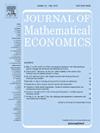An even tighter bound for the Shapley–Folkman–Starr theorem
IF 0.7
4区 经济学
Q3 ECONOMICS
引用次数: 0
Abstract
Based on a previous refined Shapley–Folkman lemma, we derive a tighter error bound for the Shapley–Folkman–Starr theorem and apply the result to the course allocation problem.
沙普利-福克曼-斯塔尔定理的更严格约束
基于之前改进的 Shapley-Folkman Lemma,我们推导出了 Shapley-Folkman-Starr 定理的更严格误差约束,并将结果应用于课程分配问题。
本文章由计算机程序翻译,如有差异,请以英文原文为准。
求助全文
约1分钟内获得全文
求助全文
来源期刊

Journal of Mathematical Economics
管理科学-数学跨学科应用
CiteScore
1.70
自引率
7.70%
发文量
73
审稿时长
12.5 weeks
期刊介绍:
The primary objective of the Journal is to provide a forum for work in economic theory which expresses economic ideas using formal mathematical reasoning. For work to add to this primary objective, it is not sufficient that the mathematical reasoning be new and correct. The work must have real economic content. The economic ideas must be interesting and important. These ideas may pertain to any field of economics or any school of economic thought.
 求助内容:
求助内容: 应助结果提醒方式:
应助结果提醒方式:


